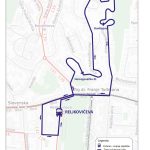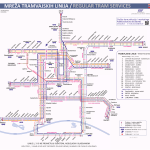One of the options could be introducing six-kuna tickets, valid for 60 minutes.
As we reported a few days ago, ZET (Zagrebački električni tramvaj, Zagreb Electric Tram) has had a HRK 29 million decrease in revenue this year due to the introduction of cheaper tickets, which are responsible for HRK 20 million of the decrease.
More than 11 million four-kuna tickets were purchased in the first six months, but citizens have stopped buying daily, monthly, and yearly ZET tickets.
As Jutarnji list reports on October 18, 2017, 1.2 million ten-kuna tickets and 366 thousand monthly passes were sold in the first six months of 2017, while 5.7 million tickets and 418 thousand monthly passes were sold in the same period in 2016.
ZET Holding members have stated that they knew that a decrease would happen, but not that it would be this big.
“If this continues, the question is what our revenue for the year will look like,” a ZET spokesperson said for Jutarnji list.
The Mayor and the City Administration are working on developing a plan to increase the sales of other tickets as well, without changing the four-kuna ticket, while some other sources have speculated that this might happen.
“Terminating the four-kuna ticket is not an option, and neither is changing its price. It has been well accepted by citizens, there has been an increase in the number of passengers, so it will not change,” the City Administration said for Jutarnji.
One of the possibilities is introducing a tariff that’s missing between the two options that are currently available – a six-kuna ticket, valid for 60 min, while the current options are four kunas for 30 minutes and 10 kunas for 90 minutes.
“The 30-minute ticket has been hugely successful because people who didn’t buy tickets at all in the past have now started buying them. On the other hand, some passengers whose journey lasts more than 30 minutes have to buy two tickets, and sometimes they don’t need both. The new model would enable passengers to buy a single ticket which would last longer, and the price difference of 2 kunas would almost be negligible,” the City Administration explained.
As Zagreb Holding is in charge of the public transport and parking in the city, one possible option to increase the company’s revenue would be increasing the prices of parking in the centre and charging parking in the entire city. The tram system is constantly being modernised, so all trams and buses will soon get WiFi, 40 new low-floor trams will be purchased, and 250 new ticket machines for citizens to buy tickets at will also be purchased. The first step is installing 50 machines, which will cost HRK 12.5 million.
“If you consider all of this, it would be cheaper for citizens to take the tram to get to the city centre instead of driving. This would also decrease traffic jams in the centre. ZET’s revenue is important, but it is not the most important factor. Providing a better and faster service for citizens would contribute to the entire city getting added value,” the City Administration concluded.
Translated from Jutarnji list.










